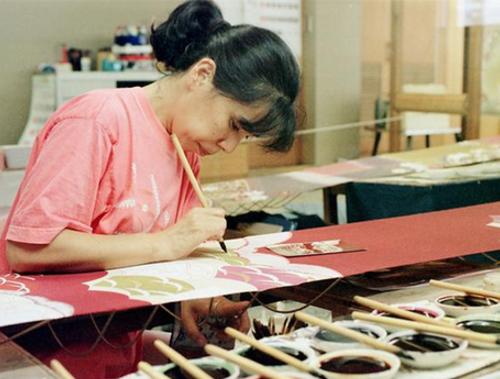(单词翻译:单击)
The weather is getting warmer in Tokyo and many Japanese men are accompanying their young children to parks on the weekends, to play football or catch, or walk with them in the woods. The mothers are always not present.
东京的天气渐渐转暖,很多日本的爸爸们在周末陪他们的小孩在公园里踢足球,或是在林中相互追赶亦或散步。而这些场景中却总是鲜见妈妈们的身影。

This is something of a sea change for Japanese men who have a reputation for being lazy at home.
日本男性因对家务事不上心而出名,而现在事情正在发生重大变化。
A poll of the Organization for Economic Cooperation and Development's member countries last year found that Norwegian men pitched in the most - 180 minutes a day - with housework and related chores while Japanese men did the least - only 62 minutes a day.
去年,一项针对经济合作与发展组织的成员国的民意调查显示,挪威男性在家务活中投入时间最长,一天达180分钟,而日本男性投入时间则最少,一天仅有62分钟。
There is a reason for Japanese men's unhelpfulness at home.
日本男性在家里帮不上忙的原因如下。
In Japan's corporate culture, many employees - almost all men - are more devoted to their company than to their family. They routinely work long hours. They accept reassignment to remote locations without question. They carouse with colleagues and corporate clients till late at night.
在日本的企业文化中,很多员工或者说几乎所有的男性员工,在公司投入的时间要比家庭投入的多。他们通常要加班。他们接受公司的委派,对于出差去边远的地方没有任何质疑。他们与同事及公司的客户一同畅饮,直到深夜。
Many young Japanese fathers today say they would like to be more involved in raising their children, but very few feel at liberty to take the child-care leave to which they are entitled by law.
如今,很多年轻的日本爸爸们称,在抚养孩子上,他们乐意更多地参与。然而,鲜有人会随意休育儿假,虽然法律赋予了他们这样的权利。
Such a work style is possible for a man married to a stay-at-home woman who excuses him duties at home, but it is a different story for a woman with children.
这样的工作方式对于娶了全职太太的男性来说还行,因为全职太太可以不需要他干家务活,但对有小孩的女性来说就要困难了。
About 70 percent of Japanese women leave the labor force after giving birth to their first child. Only about one-third of Japanese mothers with young children work, compared with 50 to 60 percent in the United States, Britain and Germany, and 75 percent in Sweden.
日本女性在生了第一胎后离开工作岗位的比率约为70%。重返职场的日本妈妈们的比例只占三分之一,而美国、英国和德国的比例为50%-60%,瑞典的比例为75%。
It is not fair to just blame Japan's corporations for Japanese women's retreat from workplaces. There are not enough child-care centers in Japan. Women are often caught in a Catch 22 situation: they cannot secure a job until a child-care slot is available, and they are not eligible for such a slot until they have a job.
如果只是责备日本公司使日本女性离开职场的话,未免有失公允。(因为)日本的幼托中心不足。日本女性总是处于进退维谷的处境:只有幼托中心有空位的话,她们才可以保证去工作,但同时只有她们有了工作,才有资格找幼托中心。
Many women, as a result, choose to stay at work rather than have children.
因此,很多女性选择留在职场,不去生孩子。
Shinwa Agency Co, Ltd, a subsidiary of Japan's Daiwa House Group, offers its employees a bonus of 1 million yen ($8,410) for a child they give birth to. But very few female employees at Shinwa have taken the bonus.
日本大和房屋集团旗下的亲和株式会社规定,员工生一个孩子会得到100万日元(8410美元)的额外津贴。然而,几乎没有女性拿过这种补贴。
It is commendable that Japanese companies are changing. Some companies including Itochu, a general trading house, and Ricoh, a printer maker, are initiating flexible working hours so as to reduce or put an end to overtime.
值得称赞的是,日本公司也在发生着变化。包括伊藤忠商事株式会社(一综合性贸易公司)和日本理光集团(一打印机制造商)在内的一些公司推出弹性工作机制,以减少加班,或不再加班。
This move allows men to engage in raising their children and working mothers to balance work and family responsibilities.
此举使爸爸们可以参与到抚养孩子中,陪职场妈妈们协调好工作和家庭上的事务。
Japan's Prime Minister Shinzo Abe is calling on Japanese corporations to appoint at least one woman to their boards. And he is considering changing the tax laws that discourage mothers from working and providing new training subsidies to help them return to the workplace following child-care leave.
日本首相安倍晋三呼吁日本公司至少任命一名女性董事,他还考虑改变对生完孩子的女性重返工作不利的税法,并对女性提供培训补助,以帮助她们在休完产假之后可以重回职场。
These initiatives are not motivated by softhearted political correctness but by hard-headed economic logic. Japan's demographic challenges are too severe, and the untapped economic potential of Japanese women is too large to ignore.
这些举措并不是来自于仁慈的“政治正确”考量,而是基于经济逻辑的冷静思考。日本人口结构带来的挑战甚是严重,而尚未开发的日本女性的经济潜力巨大,不容忽视。
Japan needs to expand its workforce, which is shrinking rapidly as a result of a declining birth rate and a rapidly aging population. The road ahead for Abe's mission to remedy gender inequality in the Japanese workforce is bumpy. Japan needs to change its deeply rooted social values on gender roles and foster a work style in which overtime is not the rule but the exception.
由于人口出生率下降且人口老龄化加速,日本劳动力正在迅速萎缩,因此急需扩大劳动力。日本劳动力性别存在差异,安倍想要弥补这一差异实属不易。日本需要改变其对性别角色根深蒂固的社会价值观,并培养这样的工作作风——加班不是规定,只是例外。
The best - and the simplest - way to encourage women's full participation in the workforce is to make child day care more readily and widely available. Doing so will allow mothers to return to workplaces whenever they see fit.
鼓励女性能够加入全职的最好且最易的办法便是日托所变得更多更广泛。这样,妈妈们在方便时可以重返职场。
Tokyo's parks are one of the places where the changes underway in Japanese society are visible and laudable.
人们可以在一些地方看到日本社会发生的可喜的变化,东京的公园便是这些场所之一。
The author is China Daily's Tokyo bureau chief.
作者:蔡虹,《中国日报》东京记者站站长。


